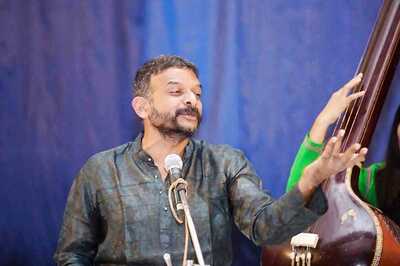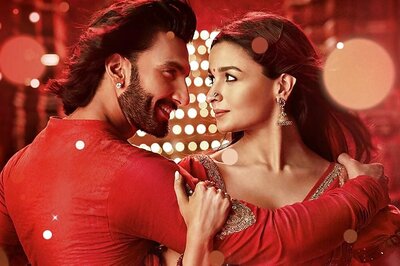
views
How can you rate Pyaar Ka Punchnama 9/10, a journalist asked me point blank when I was temporarily on the other side of the fence, facing interviews during the release of my film. Now, a rating never is any indication of how good a film is. It is only an indication of how much the person rating it likes it.
And that's the only truth.
And no matter what you do, you cannot contest or argue with that truth – that I liked a film or didn't like a film. What you can argue with are the reasons why I liked it or why I didn’t. And those are the discussions I love.
The day before Good Night Good Morning released, SRK fans trolled our IMDB page to teach us critics a lesson. I review for The Hindu and the much-hated Raja Sen from Rediff plays a supporting role in the film. How dare we write negative reviews on Don 2? SRK fans ran a campaign on Twitter calling other fans to rate GNGM 1/10 since there’s no 0/10 option. I would be lying if I said it didn’t matter at all.
Of course it matters. Because unlike a review that’s one person's opinion, an IMDB rating was some sort of a barometer of how many people liked it and how many didn’t. And being a niche film without stars, we were catering to a film literate audience that was IMDB-savvy and that rating really seemed to matter.
We created about 20 fake accounts to counter the 28 1/10 votes and posted reviews (real ones done by others) under our own accounts crediting the real author at the end of the post of course.
To our disappointment, it didn’t work. The rating remained unchanged. Because IMDB uses some weighted average system that is a well kept secret to stop people from manipulating the ratings. We asked friends to bail us out by voting. That didn’t help much either because the trolls kept doing the same.
And so it happened. We started off with our 3.4/10 rating, the worst thing that we could’ve asked for. But thankfully for us, reviewers seemed to like our film a lot more. And more than the critics, the people who watched it became the film’s ambassadors.
We got over 50 positive reviews with a minimum rating of 3 stars and over 500 tweets and an equal number on FB through comments and status updates within a week for a film that barely 1500 people watched in the theatres before Agneepath kicked us out of the theatres on Day 7.
My friend Raja Sen wrote a column on Mumbai Mirror inviting people to bring out their claws. We had prepared ourselves for the worst. Considering how much we give out, we really wanted to see how much we could take ourselves.
Luckily, we didn't have to take much. Yes there were a few friends who hated it and chose to keep their opinions to themselves (something we always get to hear about through DMs because Twitter makes the world a smaller place!) but that is a part of the game. You can never please everyone.
We got lucky that many people liked our film. Our IMDB rating shot up to 7.6/10 with over 200 votes (Of course, that is perhaps a little too much for our little film, I agree and so no complaints that it is now much less).
Within a month of the release of the DVD, we became the film that sold more DVDs than any Shah Rukh or Salman film last year on Flipkart (climbing up to No.5 on Flipkart's all time best seller list – only behind Rockstar, The Dirty Picture DVD, The Dirty Picture VCD and Zindagi Na Milegi Dobara.
That there was our big "Fuck You" to all those trolls who did stuff out of pure malice, without even watching the film. As you can guess by my tone, obviously I hate those pests.
To most filmmakers, every critic who gives a bad review is one such pest. They hate them from the bottom of their bottom. The smart ones just know to conceal it better. And the not-so-smart ones like Samir Karnik shoot their mouth off and provide us the laughs.
Being a critic, I do know that a review is one person’s opinion… But when there are more people who share that same opinion, it is perceived as a larger truth by the average reader/browser and read as an evaluation of the quality of the film, pretty much like the IMDB rating.
You know when a film gets 1 star or 1 and a half stars from every other critic in town must be quite bad. You know a film that gets 3 stars or above from every other critic must be quite decent. That's also how I believe that I have made a decent film – by looking at the aggregate of the reviews and the arguments made against it and not just individual opinion – because honestly, there's no way I can judge my own film till the time I have had the benefit of time and distance.
I can't watch my first film again. I hate it. I removed all evidence of its existence. Now, I remember getting good and bad reviews for my first film. I remember linking both the good and the bad reviews on my blog back then. I was going to send one of them a ticket to my new film inviting him to rip it apart again when I heard he told a common friend how he ‘Pwned’ my first film (when I had sportingly linked to his negative review from my blog). So I changed my mind and didn’t send him that ticket. Why? Because we don’t like people who don’t like us. Simple.
It's always that way. There may be 200 people saying good things about your film but that one guy who hates it/disses it always gets your attention. You feel the need to react to that one guy instead of reveling in the glory of all the positivity.
No filmmaker finds it in him to forgive the guy who has dismissed months of his hard work, blood and sweat. It's only human. In fact, I respect the ones who have told me to my face that they can't be friends with me. Like this popular actor down South: "For you, films maybe a part time hobby. For me, films are my life. If you don't like my films, we can't be friends." That is the most honest statement I have ever heard from any person in the film industry. I respect the guy for that.
I had given one of his weakest films a bad review and the producers sent us a legal notice threatening to sue me for 25 crore to compensate for the loss! I wish reviews had that kind of power. Bodyguard would have flopped given how it was ripped apart by critics almost unanimously.
But the thing about conflict is that it suddenly puts the critic at a disadvantage. It's a stalemate. If you say anything positive about his next film, you are a suck-up. If you say anything negative, you are nursing a grudge. I have lost many friends to this politics of reviewing.
Having seen the ugly side, I can safely say that there are just a handful of filmmakers who I know who can truly take it like a man.
I am not going to take names. But here’s a sample.
One filmmaker stopped following me or responding to me and another critic after a bad review of his film last year.
Another champion of independent cinema feigns friendship during the occasional run-ins but chose to maintain radio silence about my film when it could’ve really done with a little support during the month of release, especially after he claimed to like it. Of course, no one owes anyone anything. The only point here is that we are certainly NOT friends because we share that awkward critic-filmmaker relationship.
A studio boss stopped following me on Twitter the day my Yearend list was out in papers minus his films. Another industry buddy who gave me gyaan on how cool he is with criticism told a fellow critic in a moment of weakness that we critics didn’t know shit and we should first go make a film to know what it’s like (More on this at the end of this post).
He also later made sure he told me why he thought my film sucked and how he could write a better film. More recently, a filmmaker got largely good reviews, stopped entertaining calls from his former colleague and friend after she wrote a mildly negative counter-point.
Another master filmmaker who made a bad film last year recently admitted to a friend how he wasn't able to deal with the negative review no matter how hard he tried. "You should have told me first before writing it." "But you didn't have a problem when I wrote good stuff without telling you beforehand." "Who complains about good stuff?" Again, this was an honest response from a guy who had stopped taking calls. Most filmmakers fake it.
Like Harry told Sally that a boy and a girl can never be friends, a filmmaker and a critic can never be friends. Bad sex always gets in the way. "Boohoo! You screwed me." There are always exceptions to the rule, of course and I am lucky to have such friends too... though one can never be sure these days ;)
And as for that much used argument: "Go make a film and then criticise…”
Here's the thing, guys. That shows you don't understand the medium enough. Filmmaking is a process of construction, putting it together block by block while film criticism is a process of deconstruction and taking it apart piece by piece. Blocks and pieces are like chalk and cheese sometimes because what you thought was chalk was probably cheese for the person consuming it.
It's like assembling an impossibly giant jigsaw puzzle of an image you have only inside your head against a deadline. Sometimes you don’t even have all the pieces, especially when you are an independent filmmaker. And once you have left the room with whatever you have assembled in the time and space you were given, a bunch of people walk in to make sense of what you’ve put together.
They are able to spot some parts of it and don’t get some. It does not always reflect their inability to read, it sometimes reflects your inability to put it together. The truth is always somewhere between the two.
As my friend Cilemasnob often says, "You don't need to know how to cook to comment on the taste of food."
And during that week when I was briefly on the other side of the fence, almost every other journalist asked me if you need to be a filmmaker to be a critic or vice-versa. No way. They require slightly different skill-sets. That’s like saying "You should have experienced a heart attack at least once to be a good cardiologist". Or to extrapolate that thought further, "You should have been a corpse once to be a sensitive undertaker."
P.S: "Even you can't take criticism!"
This is such a recursive loop, one that renders the entire exercise of arguing futile. When you make a counter argument to criticism, it is seen as a sign that you cannot take criticism simply because the guy criticising you cannot deal with the fact that he's being criticised for his criticism. There's no end to this, every criticism can be counter criticised and so on until…
a. It reaches a "Let’s agree to disagree" stalemate
b. You stop being friends
c. You pretend you are friends but actually think the other is an asshole.
Therefore, a critic and a filmmaker can never be friends. QED.(Sudhish Kamath is a film critic with The Hindu and a two-film old independent filmmaker)

















Comments
0 comment